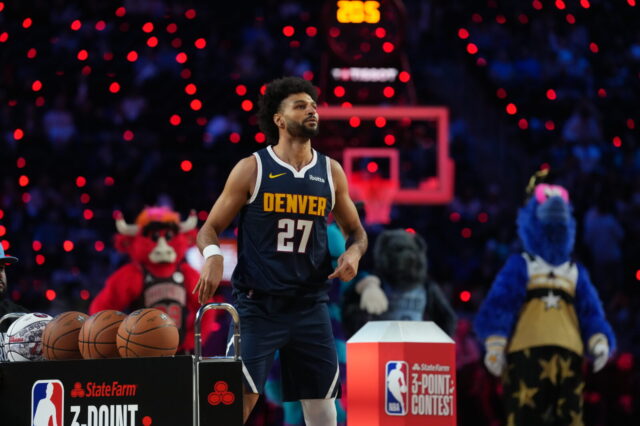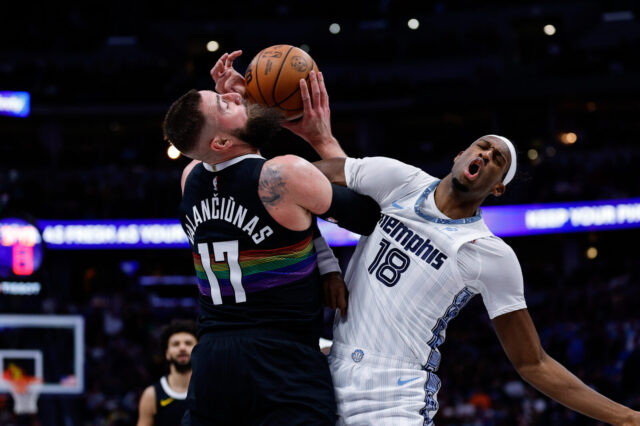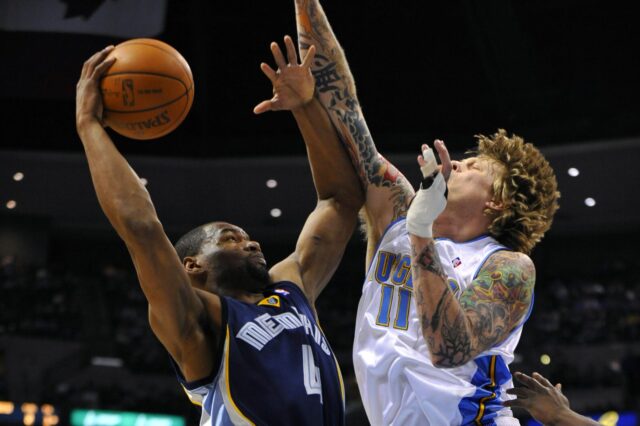Even though they are slated to select 22nd, the Nuggets should be doing ample amounts of homework in advance of Thursday’s NBA Draft. Because if recent history is any indication, the Nuggets just might be able to steal an impact player.
Greivis Vasquez, Omri Casspi, Rodriguez Beaubois, Taj Gibson, Courtney Lee, Serge Ibaka, Nicolas Batum, George Hill, Darrell Arthur, Jared Dudley, Wilson Chandler, Rudy Fernandez, Aaron Brooks, Arron Afflalo, Tiago Splitter, Kyle Lowry, Shannon Brown, Jordan Farmar, Jarrett Jack, Francisco Garcia, Jason Maxiell, Linas Kleiza, David Lee, Delonte West, Tony Allen, Kevin Martin, Beno Udrih, Travis Outlaw, Kendrick Perkins, Carlos Delfino, Leandro Barbosa, Josh Howard, Tayshaun Prince, Nenad Krstic, John Salmons, Samuel Dalembert, Jamaal Tinsley and Tony Parker.
Impact players (of varying degrees) all. All drafted at 22 or higher in the NBA’s first round within the past 10 years. And I’m not even including some of the notable second round steals during that span (like Gilbert Arenas, Carlos Boozer, Mehmet Okur, Mo Williams and Monta Ellis that every team missed on in the first round over the years).
Considering that there were over 70 players drafted between the 22nd pick and the end of the first round (which expanded from 28 to 30 picks between 2001 and 2005) between 2001 and 2010, the list of names above means that the Nuggets have approximately a 50% chance of landing an impact player in this week's draft.
So why all the insistence that the Nuggets trade up on Thursday?
For starters, many (okay, most) pundits are already writing off the 2011 NBA Draft as a “weak” draft. And thus, the theory goes that if there are any impact players at all a team must snag them in the top half rather than the latter half of the draft. But sometimes a “weak” draft simply means that the draft is devoid of a LeBron James, Kevin Durant or Derrick Rose who anchors the draft. Sure, Kyrie Irving and Derrick Williams might be slated a few spots down during a solid draft, but that doesn’t mean that this year’s late first round picks are going to be any worse than in any other years.
Take last year’s draft, for example. Other than Eric Bledsoe (drafted 18th by Oklahoma City but played for the Clippers) and Vasquez (drafted 28th by Memphis) there wasn’t a single player outside the top-five picks who made a substantive impact on his team last season. And even in Vasquez’s case, his impact didn’t come until the postseason. And yet the 2010 draft, with the likes of John Wall, Evan Turner, Derrick Favors and DeMarcus Cousins leading the way, was supposed to be a good one.
In 2007, the draft was supposed to be "top heavy" without a lot of depth. And yet Dudley, Fernandez, Chandler, Brooks, Afflalo and Splitter were all taken within the last nine picks. Those in Denver certainly know the value of Chandler and Afflalo and we sure wouldn't mind having those other guys on the roster, too.
In looking closely at the list of names above, they seem to fall into two main categories: played in big-time games at a big-time college program for a big-time college coach (Arthur, Dudley, Afflalo, Lowry, Brown, Farmar, Maxiell, Jack, David Lee, West, Howard, Brooks), or came from overseas (Vasquez, Casspi, Beaubois, Ibaka, Batum, Rodriguez, Parker, etc). The remaining few others either came from no-name programs (like Hill and Martin) or were drafted straight out of high school (like Perkins and Outlaw), which can't be done anymore.
Those who have followed my draft coverage over the years know that when it comes to drafting late in the first round (or early in the second round), I favor power forwards who played for a few years at a big-time program. Unless you have a great eye for foreign talent – something the Nuggets may just have with Masai Ujiri now in charge – your odds of late drafting success are increased by taking a shot at a 6’7″-6’9″ kid who played the four-spot in the NCAA’s biggest games and for the most demanding of coaches. It’s this school of thought that made Boozer, Lee, Maxiell, Arthur, Glen Davis, Brandon Bass, Josh McRoberts and most recently DeJuan Blair absolute steals considering where they were drafted. Hell, the GMs who selected those guys should have been wearing bandannas on their faces on draft day (something the Spurs‘ R.C. Buford wears throughout June, I’m sure).
And it just so happens that the Nuggets’ greatest need entering Thursday’s draft is at backup power forward, regardless if Kenyon Martin stays or goes. Unless, of course, Raymond Felton gets traded in which case we would suddenly need a backup point guard, too.
I can't opine on what foreign talent is out there for the Nuggets to consider, but should the Nuggets hang on to their 22nd overall pick and should Felton remain in a Nuggets jersey come Thursday night, history suggests that the Nuggets set their sights on Texas' Jordan Hamilton, Kansas' Markieff Morris, Morehead State's Kenneth Faried or Tennessee's Tobias Harris (per the pundits it's looking like Florida State's Chris Singleton will be long gone before 22 comes around). Michigan's Darius Morris – a 6'5" point guard – is also an intriguing option at 22 should Felton be dealt, but the last time the Nuggets tried stealing a 6'5" point guard late in the draft his name was Darnell Mee.
So while it may be tempting for the Nuggets to trade up on Thursday – and part with a key player like Felton in order to do so – I'm not unconvinced that the Nuggets couldn't fill a roster hole by sticking with the 22nd pick and selecting a player the rest of the league falls asleep on.
Just once, it would be nice to see a Nuggets' GM wearing a bandanna on his face on draft night.


